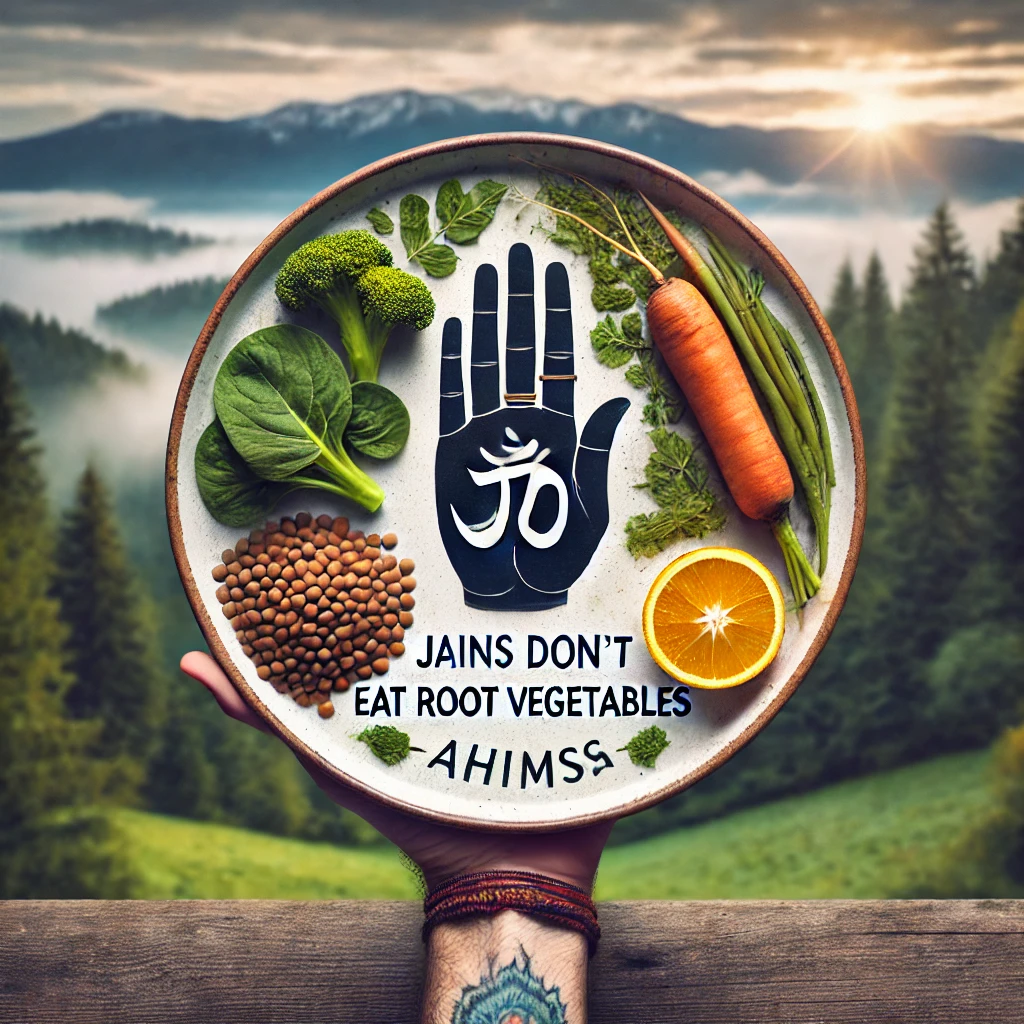Table of Contents
Why Jains Don’t Eat Root Vegetables
Jains don’t eat root vegetables like potatoes, onions, garlic, and carrots because of their strict adherence to the principle of non-violence (Ahimsa). Jainism emphasizes protecting all forms of life, including microorganisms in the soil and potential life in plants. Here’s a detailed explanation of why root vegetables are avoided in Jainism:
1. Killing the Plant
When root vegetables are uprooted, the entire plant is destroyed. For Jains, this goes against their principle of Ahimsa (non-violence), which advocates for minimizing harm to all living beings, including plants.
2. Protecting Microorganisms
Root vegetables grow underground where many microorganisms and tiny insects live. Harvesting these vegetables can kill countless small organisms, violating the vow of non-violence.
3. Sprouting Potential
Root vegetables like potatoes and onions can regrow into new plants. Eating these destroys the potential for future life, which is contrary to Jain values.
4. Presence of Microbes
Root vegetables tend to carry more microorganisms compared to other foods. Consuming them might lead to unknowingly harming these tiny beings, which Jains strictly avoid.
5. Spiritual Discipline
Avoiding root vegetables reflects a commitment to self-discipline and simplicity, key aspects of Jain living. It ensures they remain mindful of their actions and their impact on the environment.
FAQs About Why Jains Don’t Eat Root Vegetables
Q1: Why do Jains avoid garlic and onions?
Jains avoid garlic and onions because they are root vegetables. Additionally, these vegetables are considered to increase desires and passions, which goes against the Jain principle of self-control.
Also Read Why Jains Don’t Eat Onion and Garlic: A Deep Dive
Q2: Do all Jains follow this rule strictly?
Yes, most practicing Jains follow this dietary restriction strictly, especially during religious festivals or fasts.
Q3: Can Jains eat any underground foods?
No, Jains refrain from all underground foods, including potatoes, carrots, radishes, and ginger, as they involve uprooting the plant.
Q4: How does this align with Jain principles?
Avoiding root vegetables aligns with Jain principles of non-violence (Ahimsa) and non-attachment (Aparigraha) by reducing harm to living beings and practicing restraint.
Conclusion
By avoiding root vegetables, Jains honor their commitment to non-violence and protect even the smallest forms of life. This dietary practice reflects their deep respect for life and spiritual discipline, making Jainism unique in its approach to Ahimsa.
जैन धर्म में जड़ वाली सब्जियाँ क्यों नहीं खाई जातीं?
जैन धर्म में अहिंसा (Non-violence) के सिद्धांत का पालन करते हुए, जैन अनुयायी आलू, प्याज, लहसुन और गाजर जैसी जड़ वाली सब्जियाँ नहीं खाते। जैन धर्म में हर जीव, चाहे वह कितना भी छोटा क्यों न हो, की रक्षा करना महत्वपूर्ण है। आइए जानते हैं कि जड़ वाली सब्जियाँ क्यों वर्जित हैं:
1. पौधे की हत्या
जड़ वाली सब्जियों को उखाड़ने से पूरा पौधा नष्ट हो जाता है। जैन धर्म में किसी भी जीवित प्राणी को हानि पहुँचाना अहिंसा के विरुद्ध माना जाता है।
2. सूक्ष्म जीवों की रक्षा
जड़ वाली सब्जियाँ मिट्टी के नीचे उगती हैं, जहाँ कई छोटे-छोटे जीवाणु और कीट रहते हैं। इन्हें उखाड़ने से इन जीवों की हत्या हो सकती है, जो जैन धर्म के सिद्धांतों के खिलाफ है।
3. अंकुरण क्षमता
आलू और प्याज जैसी जड़ वाली सब्जियाँ फिर से उग सकती हैं। इन्हें खाने से संभावित नए जीवन का नाश होता है, जो जैन धर्म के मूल्यों के विपरीत है।
4. सूक्ष्म जीवों की उपस्थिति
जड़ वाली सब्जियों में अन्य खाद्य पदार्थों की तुलना में सूक्ष्म जीवाणु अधिक होते हैं। इन्हें खाने से अनजाने में इन जीवों की हत्या हो सकती है।
5. आत्म-अनुशासन
जड़ वाली सब्जियों से परहेज़ आत्म-अनुशासन और सादगी को दर्शाता है। यह जैन धर्म की मुख्य शिक्षाओं में से एक है, जो हर क्रिया के प्रति जागरूकता सिखाती है।
अक्सर पूछे जाने वाले सवाल (FAQs)
प्रश्न 1: जैन प्याज और लहसुन क्यों नहीं खाते?
प्याज और लहसुन जड़ वाली सब्जियाँ हैं। इसके अलावा, इन्हें खाने से इंद्रियों में उत्तेजना होती है, जो जैन धर्म के आत्म-संयम के सिद्धांत के खिलाफ है।
प्रश्न 2: क्या सभी जैन इस नियम का पालन करते हैं?
हाँ, अधिकांश जैन इस नियम का सख्ती से पालन करते हैं, खासकर धार्मिक त्योहारों और व्रतों के समय।
प्रश्न 3: क्या जैन कोई भी मिट्टी के नीचे उगने वाला खाद्य पदार्थ खा सकते हैं?
नहीं, जैन सभी प्रकार की जड़ वाली सब्जियों, जैसे आलू, गाजर, मूली और अदरक, से परहेज़ करते हैं।
प्रश्न 4: यह जैन सिद्धांतों से कैसे जुड़ा है?
जड़ वाली सब्जियाँ न खाने से अहिंसा (Non-violence) और अपरिग्रह (Non-attachment) के सिद्धांतों का पालन होता है, जिससे जीवों को हानि से बचाया जाता है।
निष्कर्ष
जड़ वाली सब्जियाँ न खाकर जैन धर्म के अनुयायी अपने अहिंसा के सिद्धांत को निभाते हैं और हर प्रकार के जीवन के प्रति अपनी दया और सम्मान प्रकट करते हैं। यह आहार प्रथा जैन धर्म को अनोखा बनाती है।




